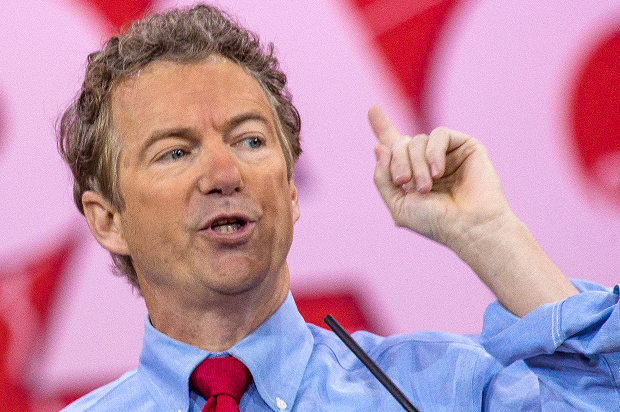Happy Rand Paul Day, America! In today’s candidate debut we get the “libertarian” Republican candidate who intends to grow the party into radically hip, youthful strongholds with a fresh platform of social conservatism, deregulation, domestic fiscal sadism and as much money as possible for the Pentagon. Is America even ready for this much #liberty?
Rand Paul Day holds a very special meaning for political reporters. It means that Paul and his “people” will once again be fielding questions from the press after a week-long “out of pocket” experience in which the senator, famous for having rapidly disseminated opinions on everything, was too busy to comment on all topics ranging from the gay pizza situation in Indiana to the pre-agreement reached with Iran. Paul’s announcement in Louisville today and the media blitz that follows will bring Paul back into pocket. The Paul campaign’s best strategy for winning the nomination and the presidency would be for the candidate (Paul) to not speak once, but that’s just not feasible.
Paul’s campaign did kinda-sorta break its embargo on not communicating with the media whatsoever early yesterday. Doug Stafford, a spokesman for Paul’s PAC, offered these fairly but not entirely boilerplate comments on the Iran negotiations to Bloomberg’s Dave Weigel yesterday:
“We don’t know the details of the deal yet,” said Doug Stafford, a spokesman for Paul’s PAC. “Senator Paul will be watching closely and believes any deal must make clear Iran cannot acquire a nuclear weapon, allows for full verification and is approved by Congress. He voted for sanctions both times they were put before Congress and believes only Congress should remove those sanctions.”
We’ll see if Candidate Paul offers a little bit more about the preliminary deal after his announcement, but right now it looks like he’s going to make the predictable play: he’s going to hide behind process objections.
Paul “believes any deal must make clear Iran cannot acquire a nuclear weapon.” Well, yes, that’s the whole point of the deal, in accordance with the official position of the Obama administration. There will be hawks who say that this deal doesn’t prevent Iran from getting a nuclear weapon because those hawks believe Iran will always lie and will set up a secret operation somewhere. There is no way to change their minds on this.
Paul believes any deal must “[allow] for full verification.” Again, verification and enforcement is one of the stronger points of this deal. Again, there will be hawks who say that there is no such thing as full verification when it comes to Iran because those hawks believe that Iran will always lie to inspectors.
If you believe that Iran will always lie itself out of any diplomatic agreement, as hawks do, then there’s no point in supporting any negotiating with Iran, so hawks don’t. Though Rand Paul is all about larding up the Defense budget these days, he still hasn’t fully come around to the hawks’ view that diplomatic engagement with Iran (/anyone) is a waste of time. As Weigel points out in his piece, Paul, like his father, won over many of his supporters early on by opposing the neoconservatives’ saber-rattling against Iran. He’s now in the uncomfortable position of having to either support diplomacy with Iran (which in GOP primary politics is akin to offering all 11 million undocumented immigrants immediate citizenship and a free mansion confiscated from a white person), reject diplomacy with Iran, or dodge indefinitely.
And there’s no better way to dodge indefinitely than by hiding behind process. That’s embedded in the third part of Team Rand’s statement: Any acceptable deal must be “approved by Congress.” This may be a deeply held belief from Rand Paul, that Congress must be the institution that decides the future of Iran’s nuclear program. (Let it be said again that in the long-term, Congress will have to vote to lift the sanctions it put in place against Iran, so this whole debate about Congress never having any say is silly.)
If the White House gets its way, Congress will not get the 67-vote majority it needs to overturn President Obama’s veto on the Corker-Menendez congressional review bill. That would be excellent news for Rand Paul, because then he would always have a go-to excuse to not comment on the merits of the Iran deal. (It’s similar to the way Jeb Bush hides behind process when it comes to President Obama’s executive actions on immigration. Maybe he agrees with the policy, maybe he doesn’t, but he doesn’t have to comment either way as long as he can complain about the process by which the administration instituted them.)
If the administration and its partners can finalize the deal with Iran without Congress getting in the way, it will be fascinating to see how Rand Paul deals with the follow-up: Would you, like Scott Walker and Marco Rubio and Rick Perry, also burn up the deal on your first day in office? We eagerly await the lame process argument that his team comes up with as a dodge for that, too.

